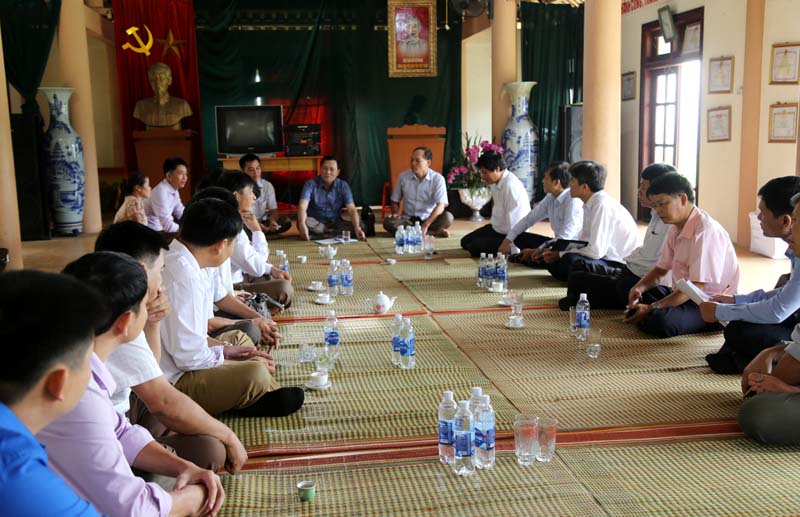
(HBO) – In recent years, to maintain security and order as well as promote socio-economic development, authorities of Lac Son district of the northwest mountainous province of Hoa Binh asked the district’s Fatherland Front committee to build a model of self-managing families and residential clusters, in line with the campaign "All people unite to build new-style rural areas and civilised urban areas”.

Leaders
of Hoa Binh province, Lac Son district attend meeting of a self-managing
inter-family group in Luong village of Thuong Coc commune.
As many as 420 self-managing groups
of families and residential clusters were set up in the district, along with
361 reconciliation groups and 534 security groups.
Such groups not only ensure
security and order, but also support each other in mobilising financial sources
for economic development.
They have mobilised about 1.14 billion
VND (approximately 48,370 USD) so far to help each other, with some groups
raising funds worth nearly 100 million VND.
To create an emulation spirit among
self-managing groups of families and residential clusters, Lac Son district
launched a campaign calling on families not to break the law. Accordingly, the
members must follow the rules of families, villages and districts in organising
weddings, funerals, festivals and longevity celebrations. They also need to stay
vigilant and be proactive in crime prevention. In cases there are people with
signs of law violation, other members should promptly take actions to stop
regrettable incidents.
Thanks to the good communications
and practical actions, the model of self-managing groups of families and
residential clusters has proved to be effective in promoting the implementation
of the Party policies and State regulations.
Notably, the attachment among
villagers has been strengthened, as family members always nurture solidarity
and support each other in economic development and poverty reduction. The model
also creates favourable material and spiritual conditions for former prisoners
to re-integrate into the society. Therefore, the rate of civilised families in
Lac Son reached more than 85 percent, with 70 percent of cultural residential clusters, fulfilling the targets
of the district./.
The emulation movement "Hoa Binh joining hands to build new-style rural areas” has been widely spreading, becoming a driving force that motivates the localities to renew rural landscapes and improve the material and spiritual lives of the residents. In this movement, the people play a central role-both as the main implementers and direct beneficiaries of its outcomes.
In response to the global digital revolution, Hoa Binh Newspaper is transforming itself into a modern and multi-platform media hub, blending cutting-edge technology with a restructured newsroom and a new generation of tech-savvy journalists.
Hoa Binh province’s Association of the Elderly recently held a conference to review the project on expanding the inter-generation self-help club model until 2025.
In a move to implement Resolution No. 57-NQ/TW, issued on December 22, 2024 by the Politburo, which targets breakthroughs in science-technology development, innovation, and digital transformation, the Hoa Binh provincial Department of Health has issued a plan to roll out the "Digital Literacy for All” campaign within the local health sector.
An Nghia Commune (Lạc Sơn District) is one of the communes that achieved the tha standard of the national new rural area in 2018. Entering a new development phase, the commune is now trying to meet the criteria for the advanced new rural development. With the strong political will and the public consensus, the commune is gradually overcoming the challenges to reach this goal, aiming for the sustainable development.



